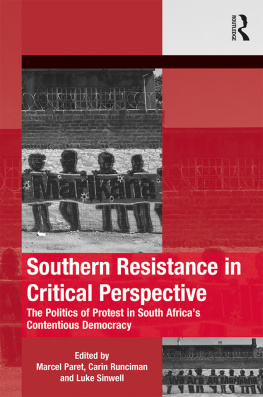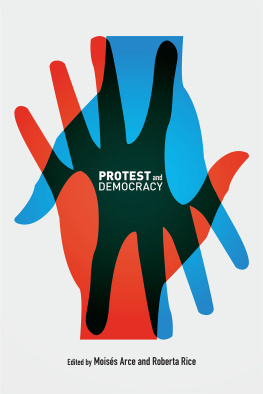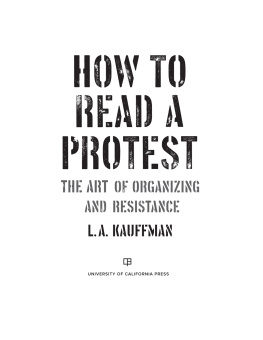Protest: Analysing Current Trends
The politics of the twenty-first century is marked by dissent, tumult and calls for radical change, whether through food riots, anti-war protests, anti-government tirades, anti- blasphemy marches, anti-austerity demonstrations, anti-authoritarian movements and anti-capitalist occupations. Interestingly, contemporary political protests are borne of both the Right and Left and are staged in both the Global North and South. Globally, different instances of protest have drawn attention to the deep fissures which challenge the idea of globalisation as a force for peace. Given the diversity of these protests, it is necessary to examine the particular nature of grievances, the sort of change which is sought and the extent to which localised protest can have global implications. The contributions in this book draw on the theoretical work of Hardt and Negri, David Graeber and Judith Butler, among others, in order to explore the nature of hegemony, the Occupy movement, the Arab Spring, the responses of authorities to protest and emotion and public performance in, and representation of, protest. The book concludes with David Graebers reply to reviews of his recent The Democracy Project: A History, A Crisis, A Movement.
This book was published as a special issue of Global Discourse.
Matthew Johnson is a Lecturer in Politics at Lancaster University, founding editor of Global Discourse and author of Evaluating Culture (Palgrave Macmillan). His research focuses on the relationship between culture, public policy and wellbeing, examining such topics as informal welfare systems, indigenous politics and genital cutting.
Samid Suliman is an Honorary Research Fellow in the School of Political Science and International Studies at The University of Queensland. His research explores migration and mobility within the political economy of global development.
Protest: Analysing Current Trends
Edited by
Matthew Johnson and Samid Suliman
First published 2015
by Routledge
2 Park Square, Milton Park, Abingdon, Oxon, OX14 4RN, UK
and by Routledge
711 Third Avenue, New York, NY 10017, USA
Routledge is an imprint of the Taylor & Francis Group, an informa business
2015 Taylor & Francis
All rights reserved. No part of this book may be reprinted or reproduced or utilised in any form or by any electronic, mechanical, or other means, now known or hereafter invented, including photocopying and recording, or in any information storage or retrieval system, without permission in writing from the publishers.
Trademark notice: Product or corporate names may be trademarks or registered trademarks, and are used only for identification and explanation without intent to infringe.
British Library Cataloguing in Publication Data
A catalogue record for this book is available from the British Library
ISBN 13: 978-1-138-84108-6
ePub eISBN 13: 978-1-317-55508-7
Mobipocket/Kindle eISBN 13: 978-1-317-55507-0
Typeset in Times New Roman
by RefineCatch Limited, Bungay, Suffolk
Publishers Note
The publisher accepts responsibility for any inconsistencies that may have arisen during the conversion of this book from journal articles to book chapters, namely the possible inclusion of journal terminology.
Disclaimer
Every effort has been made to contact copyright holders for their permission to reprint material in this book. The publishers would be grateful to hear from any copyright holder who is not here acknowledged and will undertake to rectify any errors or omissions in future editions of this book.
Contents
Samid Suliman
Jackie Smith
Nicholas Kiersey
Philippe Fournier
Helma G. E. de Vries-Jordan
Sally J. Scholz
Emmy Eklundh
Matthew F. Rech
Matthew Morgan
Paolo Cossarini
Lois Ruskai Melina
Jason L. Jarvis
Catia Gregoratti
Reviews by Lasse Thomassen, Gemma Bone, Jonathan Dean
Response by David Graeber
William I. Robinson
Rethinking political economy from Latin America
Ronaldo Munck
The chapters in this book were originally published in Global Discourse, volume 4, nos. 23 (JuneSeptember 2014). When citing this material, please use the original page numbering for each article, as follows:
Chapter 1
Introduction: Protest
Samid Suliman
Global Discourse, volume 4, nos. 23 (JuneSeptember 2014) pp. 109119
Chapter 2
Counter-hegemonic networks and the transformation of global climate politics: rethinking movement-state relations
Jackie Smith
Global Discourse, volume 4, nos. 23 (JuneSeptember 2014) pp. 120138
Reply
Counter-hegemonic networks and the transformation of global climate politics by Jackie Smith: a response by Ronaldo Munck
Ronaldo Munck
Global Discourse, volume 4, nos. 23 (JuneSeptember 2014) pp. 139140
Chapter 3
Occupy Dame Street as slow-motion general strike? Justifying optimism in the wake of Irelands failed multitudinal moment
Nicholas Kiersey
Global Discourse, volume 4, nos. 23 (JuneSeptember 2014) pp. 141158
Reply
Space, time, and the politics of immanence
Simon Springer
Global Discourse, volume 4, nos. 23 (JuneSeptember 2014) pp. 159162
Chapter 4
The multitude and localized protest: the example of the Quebec student strike
Philippe Fournier
Global Discourse, volume 4, nos. 23 (JuneSeptember 2014) pp. 163178
Reply
The problem with social movements: a reply to Fournier
Keir Milburn
Global Discourse, volume 4, nos. 23 (JuneSeptember 2014) pp. 179181
Chapter 5
The Global Justice Movement and Occupy Wall Street: spillover, spillout, or coalescence?
Helma G. E. de Vries-Jordan
Global Discourse, volume 4, nos. 23 (JuneSeptember 2014) pp. 182202
Reply
Social movement theory and resistance groups: the Global Justice Movement and Occupy Wall Street: a response to Helma G. E. de Vries-Jordan
Gilberto Algar-Faria
Global Discourse, volume 4, nos. 23 (JuneSeptember 2014) pp. 203204
Chapter 6
Transnational feminist solidarity and lessons from the 2011 protests in Tahrir Square
Sally J. Scholz
Global Discourse, volume 4, nos. 23 (JuneSeptember 2014) pp. 205219
Reply
Response to Transnational feminist solidarity and lessons from the 2011 protests in Tahrir Square, by Sally Scholz
Wendy Harcourt
Global Discourse, volume 4, nos. 23 (JuneSeptember 2014) pp. 220222
Chapter 7
Who is speaking? The Indignados as political subjects
Emmy Eklundh
Global Discourse, volume 4, nos. 23 (JuneSeptember 2014) pp. 223235
Reply
The Indignados and Occupy movements as political challenges to representative democracy: a reply to Eklundh
Ernesto Castaeda
Global Discourse, volume 4, nos. 23 (JuneSeptember 2014) pp. 236243














